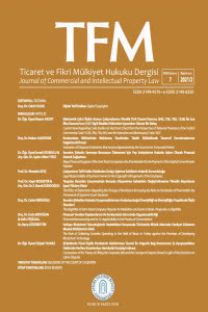PANDEMİ AŞILARI VE İLAÇLARINDA PATENT KORUMASININ DEĞERLENDİRİLMESİ
COVID-19 salgını, COVID-19 aşısı, patentin kaldırılması, TRIPS Anlaşması, zorunlu lisanslama
EVALUATION OF PATENT PROTECTION IN PANDEMIC VACCINES AND DRUGS
COVID-19 outbreak, COVID-19 vaccines, waiver of the pharmaceutical patent obligations, TRIPS Agreement, compulsory licencing,
___
- - Abbott, Frederick M., (1989) ‘Protecting First World Assets in the Third World: Intellectual Property Negotiations in the GATT Multilateral Framework’ Vanderbilt Journal of Transnational Law S:22, C;4.
- - Ahmadiani, Saeed & Nikfar Shekoufeh (2016), ‘Challenges of Access to Medicine and the Responsibility of Pharmaceutical Companies: A Legal Perspective’ Daru Journal of pharmaceutical Sciences S:24, C:13.
- - Aplin, Tanya & Davis, Jennifer (2013) Intellectual property Law: Text, Cases and Materials, 2. Baskı, Oxford, Oxford University Press.
- - Arewa, Olufunmilayo (2006), ‘TRIPS and Traditional Knowledge: Local Communities, Local Knowledge and Global Intellectual Property Frameworks’, Marquette Intellectual Property Law Review, S:10, C:2.
- - Bently, Lionel & Sherman, Brad (2014) Intellectual Property Law, 4. Baskı, Oxford, Oxford University Press.
- - Binagwaho, Agnes, Mathewos, Kedest and Davis, Sheila (2021), 'Time For The Ethical Management Of COVID-19 Vaccines', The Lancet Global Health.
- - Chapman, Audrey R. (2001), ‘Approaching Intellectual Property as a Human Right: Obligations Related to Article 15 (1) (c)’ Copyright Bulletin, Unesco Publishing, S:3, C:35.
- - Correa, Carlos M. (2000), Intellectual Property Rights, the WTO and Developing Countries: The TRIPS Agreement and Policy Options, 1. Baskı, Londra, Zed Books.
- - Doorslaer, Eddy van et al. (2007), ‘Catastrophic Payments for Health Care in Asia’ Health Economics, S:16.
- - Ellen 't, Hoen & Berger, Jonathan & Calmy, Alexandra & Moon, Suerie (2011), ‘Driving a decade of change: HIV/AIDS, patents and access to medicines for all’, Journal of the International AIDS Society, S:14, C:1.
- - Enriques, Luca (2020), 'Pandemic-Resistant Corporate Law: How To Help Companies Cope With Existential Threats And Extreme Uncertainty During The Covid-19 Crisis', European Company and Financial Law Review S:17.
- - Eppich, Christopher K. (2002), ‘Patenting Dilemma: Drugs for Profit Versus Drugs for Health’, Santa Clara Law Review, S:43, C:1.
- - Haugen, Hans Morten (2021), ‘Does TRIPS (Agreement on Trade Related Aspects of Intellectual Property Rights) prevent COVID- 19 vaccines as a global public good?' The Journal of World Intellectual Property, S:1, C:26, 1-26.
- - Holger, Hestermeyer (2008) Human Rights and the WTO: The Case of Patents and Access to Medicines, 1. Baskı, Oxford.
- - Hunt, Paul & Khosla, Rajat (2008), ‘The human right to medicines’ SUR International Journal of Human Rights, S:5, C:8.
- - Gervais, Daniel J. (2003), The TRIPS Agreement: Drafting History and Analysis, 2. Baskı, Mytholmroyd, Sweet & Maxwell.
- - Gabble, Ravinder & Kohler, Jillian Clare (2014), ‘To Patent or Not to Patent? The Case of Novartis’ Cancer Drug Glivec in India’, Globalization and Health, S:10, C:3.
- - Gökovalı, Ummuhan & Bozkurt, Kurtuluş (2006), ‘Fi̇kri̇ Ve Sinaî Mülki̇yet Hakkı (Fsmh) Olarak Patentler: Dünya Ve Türki̇ye Açısından Tari̇hsel Bi̇r Bakış’ Sosyal Bilimler Enstitüsü Dergisi, S:17.
- - Gurgula, Olga & Lee, Wen Hwa (2021), ‘COVID-19, IP and Access: Will the Current System of Medical Innovation and Access to Medicines Meet Global Expectations?’ Brunel University Research Paper.
- - Gurgula, Olga (2017), ‘Monopoly v. Openness; Two Sides of IP Coin in the Pharmaceutical Industry’ World Intellectual property Journal S:20, C:206, s. 214 Joseph, Sarah (2013), Blame it on the WTO, 1. Baskı, Oxford, Oxford University Press.
- - Karatepe Kaya, Meltem (2021), ‘Impact of the COVID-19 Outbreak on Minority Shareholder Protection’ Business Law Review, S:42, C:2.
- ISSN: 2149-4576
- Yayın Aralığı: 2
- Başlangıç: 2015
- Yayıncı: Ankara Yıldırım Beyazıt Üniversitesi Hukuk Fakültesi
FİKİR VE SANAT ESERLERİNİN TEKNİK GEREKLİLİK NEDENİYLE GEÇİCİ ÇOĞALTILMASI
GERÇEK KİŞİ TACİRİN TİCARETİ TERKİ VE TİCARETİ TERK SUÇU
TİCARET ŞİRKETLERİNİN BİRLEŞMESİ VEYA BÖLÜNMESİNDE İŞÇİ ALACAKLARININ DURUMU
Muhammed Fatih UŞAN, Canan ERDOĞAN
BORÇLAR-TİCARET VE TÜKETİCİ HUKUKU BAKIMINDAN AYIPLI MAL KAVRAMININ İNCELENMESİ
Orhan Ersun CİVAN, Murat GÜREL
5718 SAYILI MÖHUK ÇERÇEVESİNDE TELİF HAKKINA İLİŞKİN SÖZLEŞMENİN ESASINA UYGULANACAK HUKUK
PANDEMİ AŞILARI VE İLAÇLARINDA PATENT KORUMASININ DEĞERLENDİRİLMESİ
